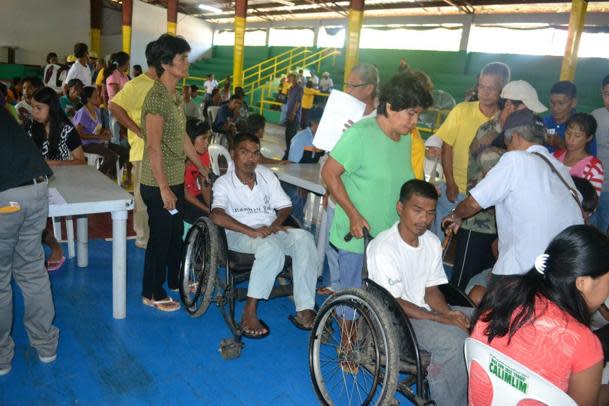Pangasinan town posts high PWD turnout in voter listup

By VERA Files
UMINGAN, Pangasinan — This town posted the highest turnout of persons with disabilities (PWDs) in the province's special voters registration, thanks to the efficient coordination of municipal government agencies, local leaders and PWD organizations.
The Commission on Elections (Comelec) in this small agricultural town listed 188 registrants, which is more than half the total number of PWDs—pegged at 384—who registered in the 44 towns and four cities of Pangasinan, according to Provincial Election Officer Jennifer Balarbar.
Finding and convincing the usually withdrawn PWDs to get out of their houses and register was a "concerted effort among the different local government offices, village officials and non-government organization," Umingan election officer Jinky Tabag said.
The PWD registration was originally set for August 11 nationwide, but the schedule had to be moved to August 17 in Umingan because of the heavy onslaught of monsoon rains that affected most of Luzon especially Metro Manila.
The turnout at the town gymnasium was "so big" that even Tabag
said she was surprised. "We were expecting only 99 because that was the number given to me by all the village heads when I called them up for confirmation," she said. Umingan in eastern Pangasinan has a population of 62,497 as of 2008.
Of the 188 registrants, 124 updated their records, 60 are new registrants, two were transferees, one was reinstated and another one corrected an entry. The registration of three other PWD transferees was set for hearing by the election board.
Tabag said that because of their disability, PWDs could find it difficult to go to the registration center but Municipal Social Welfare and Development Officer Elma Baquio helped identify the PWDs by coordinating with the village chiefs. She then provided the list to the Comelec.
Elias Duro, president of the Association of Persons with Disability Inc, the PWD organization of the town, also obliged and assisted in the listing of PWDs eligible to vote. It was Duro who asked for the postponement of the special registration day, citing the bad weather condition, Tabag said.
But the real effort to locate the PWDs in the villages fell on the barangay captains. "It was they who went from house to house locating the listed persons we gave, and finding the others who were not listed," Tabag said.
The captains also screened the PWDs to see if they are still eligible to vote. One captain said he did not bring the PWDs from his village because one was suffering from mental disability while another, an 80-year old woman, was bedridden.
Another barangay captain was not able to bring any PWDs, but still came to the registration center, explaining he could not convince a PWD from his village to register, Tabag said.
On August 17, Comelec personnel were already at the registration center an hour before the 8 a.m. opening. But PWDs started trooping to the center before it opened, assisted by family members, barangay health workers, or the captains themselves.
The barangay captains with service vehicles ferried the PWDs from their homes to the registration center, while the municipal government provided transportation for villages without vehicles and brought the PWDs to the center and back home.
"At first, they were shy because of their disabilities. But later they seemed happy to have been given the right to become voters," Tabag said.
The PWDs were patient and uncomplaining even if they had to stay in line to wait for their turn to register, she said.
Some of the PWDs arrived in wheelchairs, Tabag said. Two brothers in their 30s have a degenerative disease that manifested only when they were in their college years. One of them has lost his ability to speak.
A heartbreaking case was that of a "good-looking young man who lost his hand to an explosive during a New Year revelry," she said. The other registrants have lost a limb, have autism, have blurred vision, and other disabilities. A deaf teenage girl who turns 18 on election day, May 13, 2013, was the youngest to register.
"We prepared for emergencies, " Tabag said. A medical team was on hand, and an ambulance was ready, just in case. Several police personnel were also around in case of untoward incidents.
And to spread a little cheer, a simple snack of packed juice and cupcake was served to the PWDs and their assistants right after they finished registering.
"We finished the job at six o'clock in the evening. It was a tiring day for everyone, but it was a happy and memorable occasion for us. We also realized that PWDs are accepted as they are. We did not hear any taunt from the many people who came to the registration center," Tabag said.
Pangasinan is among the top five provinces with the most number of voters nationwide while the National Household Targeting System for Poverty Reduction's survey counts the province among the top ten with the most number of PWDs.-- Yolanda Fuertes
(This story is part of Reporting on Persons With Disability, a project of VERA Files in partnership with The Asia Foundation and Australian Agency for International Development. VERA Files is put out by veteran journalists taking a deeper look at current issues. VERA is Latin for "true.")


